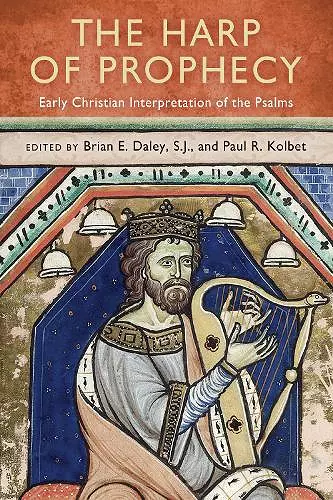The Harp of Prophecy
Early Christian Interpretation of the Psalms
Paul R Kolbet editor Brian E Daley, SJ editor
Format:Paperback
Publisher:University of Notre Dame Press
Published:30th Jan '15
Currently unavailable, and unfortunately no date known when it will be back

The Psalms generated more biblical commentary from early Christians than any other book of the Hebrew and Christian canon. While advances have been made in our understanding of the early Christian preoccupation with this book and the traditions employed to interpret it, no study on the Psalms traditions exists that can serve as a solid academic point of entry into the field. This collection of essays by distinguished patristic and biblical scholars fills this lacuna. It not only introduces readers to the main primary sources but also addresses the unavoidable interpretive issues present in the secondary literature.
The essays in The Harp of Prophecy represent some of the very best scholarly approaches to the study of early Christian exegesis, bringing new interpretations to bear on the work of influential early Christian authorities such as Athanasius, Augustine, and Basil of Caesarea. Subjects that receive detailed study include the dynamics of early Christian political power, gender expressions, and the ancient conversation between Christian, Jewish, and Greek philosophical traditions. The essays and bibliographic materials enable readers to locate and read the early Christian sources for themselves and also serve to introduce the various interdisciplinary methods and perspectives that are currently brought to bear on early Christian psalm exegesis. Students and scholars of theology and biblical studies will be led in new directions of thought and interpretation by these innovative studies.
"This wonderful volume shows us the Psalms as a living and sacred text, forming and nurturing the individual and communal lives of early Christians. Each essay sheds light of a distinct hue on this complex reality until the whole is seen with a clarity not previously apparent. These rich essays explore the techniques of ancient interpretation, the theological underpinnings that allowed the Psalms to be seen as a God-given language for those being incorporated into Christ, and the social contexts that shaped the use and interpretation of the Psalms. Each is excellent; as a whole the collection is a rare gift." —Lewis Ayres, Durham University
"The editors of this volume have engaged a stellar cast of thoughtful scholars to add to the burgeoning retrieval of Christianity’s faithful devotion to the Psalter. The essays herein attest to the Psalter’s infinite fecundity to offer personal emotional support under pressured circumstances, a program for progress in the spiritual life, a map for ecclesiastical authority to lead the church, an opportunity to experience 'the whole Christ,' and much more. Each essay will repay the reader’s effort tenfold." —Ellen T. Charry, Margaret W. Harmon Professor of Systematic Theology, Princeton Theological Seminary
"This exceptional collection of essays brings the book of Psalms and its transformative role in early Christian lives into new focus. The distinguished scholars gathered in this volume illustrate how the Psalms animated the liturgical, devotional, and scholarly habits of early Christians. This singular book bequeathed a rich vocabulary to its readers and hearers, new ways of thinking about God and themselves, and ultimately the words with which to address God. The Harp of Prophecy provides a splendid introduction to the ways in which early Christians re-imagined the Psalms." —Peter Martens, Saint Louis University
“The twelve essays in this volume provide materials to promote further research into the depth and range of the essential early Christian practice of appropriating the language of the Psalms.” —New Testament Abstracts
"The work aims to explore how early Christians experienced their faith through the 'transformative power' of personal prayer in light of the Psalter. As such it moves beyond discussions on Patristic exegesis, dogmatic controversy and political polemics to explore the burgeoning field of early Christian psalmody. . . an invaluable companion to the student of early Christianity given the prominence of the psalms in the life, worship, and thought of the faithful." —Irish Theological Quarterly
"The volume makes an important contribution—some might even say more so than modern biblical studies—to reclaiming the importance of Scripture for the tradition of the church." —Theological Studies
"The Harp of Prophecy is a richly rewarding collection, not only because of the immense depth and breadth of scholarship displayed in its presentation of the early Christian sources, but also. . . because that scholarship is deployed in such a way as to provoke reflection on. . . what is going on when ancient words are spoken in, with and for contemporary communities that read them as scripture." —Modern Theology
"A collection of unusually solid and satisfying essays, written with clarity and penetration; a very welcome contribution to a burgeoning area of research." —Journal of Ecclesiastical History
“The Harp of Prophecy, an investigation into the early Christian interpretation of the Psalms, is an outstanding set of essays written by a diverse group of scholars. . . . One would be hard-pressed to find a better treatment of patristic readings of the Psalms in a single volume.” —The Living Church
“[A] wonderful collection of essays that will both introduce novices to the field while also challenging veterans to think more deeply about their field of study.” —Center for Ancient Christian Studies
“This volume provides readers with a range of patristic authors and approaches to the Psalms and its influence on writers of the New Testament and in subsequent Christian thought and prayer. The Harp of Prophecy is a must read for scholars interested in the history of theology and biblical interpretation.” – Commonweal Magazine
ISBN: 9780268026196
Dimensions: 229mm x 152mm x 20mm
Weight: 514g
348 pages